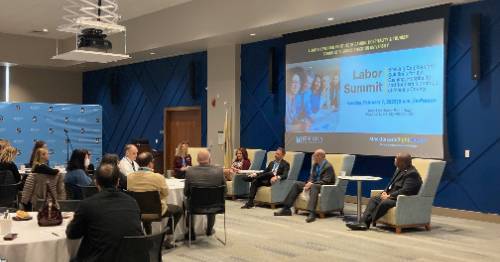Exploring new pathways to solving employment challenges
By Jennifer Aarons, LIGHT Faculty Fellow and Teaching Specialist Hospitality, Tourism and Event Management Studies, Stockton University School of Business
The hospitality and tourism industries continue to face employment challenges. It has been well documented that these industries were hit the hardest during the COVID-19 pandemic and are still recovering. While the desire for travel by consumers has returned to pre-pandemic levels, businesses in hospitality and tourism continue to face an uphill battle regarding staffing. The hospitality and tourism businesses in Atlantic City and Atlantic County are recovering at a slower pace than the rest of New Jersey. The Atlantic City-Hammonton Metro Area reported an unemployment rate at the end of 2020 of 11.1%. This is almost four points higher than the State of New Jersey,which was reported to be 7.4% for the same time period. At the end of 2022, the unemployment rate in the Atlantic City-Hammonton Metro Area was 4.5% (preliminary) vs. 3.4% (preliminary) for New Jersey. While there has been significant improvement, this area continues to struggle.

Jennifer Aarons,
LIGHT Faculty Fellow and Teaching Specialist Hospitality, Tourism and Event Management Studies, Stockton University School of Business
Why is it so challenging for businesses in the hospitality and tourism industry to fill their open positions? This is a question that we at the Lloyd D. Levenson Institute for Gaming, Hospitality and Tourism (LIGHT) sought to explore.
We surveyed human resources professionals from local casino and noncasino companies and job counselors from the One Stop Career Center on this topic. We asked a series of questions regarding employment, job opportunities and skill sets.
According to both groups, the most common persistently vacant positions include housekeepers, dealers, cage cashiers, cooks, bartenders and security officers. When asked for possible reasons why people do not apply for these positions, shift work and work-life balance were the most common reason. Benefits, transportation and inability to obtain the necessary certification or licensing rounded out the top three. Hourly pay was ranked in the top five reasons.
We also asked both groups to rank certain hard and soft skills in importance. Interestingly, there were differing results. When ranking soft skills, both groups agreed that customer service skills were the most important. However, the next top ranked soft skills by human resource professionals were teamwork, communication and adaptability, while the job counselor ranked time management, self-directed and problem-solving next. This represents a disconnect between what employers are seeking vs. what job placement services are focusing on. With this information, job placement organizations can better tailor their training programs to better suit the needs of the industry.

The differences in rankings of hard skills were even greater. Human resources professionals ranked language proficiency and position specific knowledge highest in importance, while job counselors ranked specific license/certification and work experience as highest. This presents opportunities for industry and job placement organizations to engage in partnerships to close these gaps.
On February 7, 2023, LIGHT sponsored a Labor Summit where these findings were presented. A panel of industry experts, union leadership and workforce development shared their insights on these findings. Attendees of the summit engaged with the panelists and learned about various opportunities to forge relationships and develop programs to address our employment needs.
The research by LIGHT highlighted opportunities for both industry and job placement organizations. The summit created an environment for all parties to learn and explore new pathways to solving employment challenges.
Jennifer Aarons is a Teaching Specialist in the Hospitality, Tourism & Event Management Studies (HTMS) Program in Stockton University's School of Business. Stockton University's School of Business has earned accreditation by the Association to Advance Collegiate Schools of Business (AACSB), an international body whose accreditation has been earned by less than 5 percent of the world's business programs.
Jennifer earned her undergraduate degree in Human Resources from the University of Delaware, her master's degree in Hospitality Administration from the University of Nevada, Las Vegas, and her doctorate in Education from NOVA Southeastern University. She has over twenty-five years' experience in the hospitality industry across many fields, including hotel operations, housekeeping, reservations, restaurant management, and human resources in casino and non-casino hotels. Jennifer spent the majority of her career in the spa and recreation segment at Borgata Hotel, Casino & Spa, where she refined her skills in managing, leading, mentoring, and budgeting.
Jennifer first joined Stockton as an Adjunct Professor after creating the Spa Management in Hospitality course as a new elective for the HTMS program in 2011. In 2022, she launched the Introduction to Wellness Tourism class. She worked with the Holistic Healthcare Minor program so both courses could become acceptable electives within that program as well. In addition to these courses, Jennifer teaches Introduction to HTMS, Food & Beverage Management, Introduction to Casino Management, Hotel Administration & Operation and Event Management.




